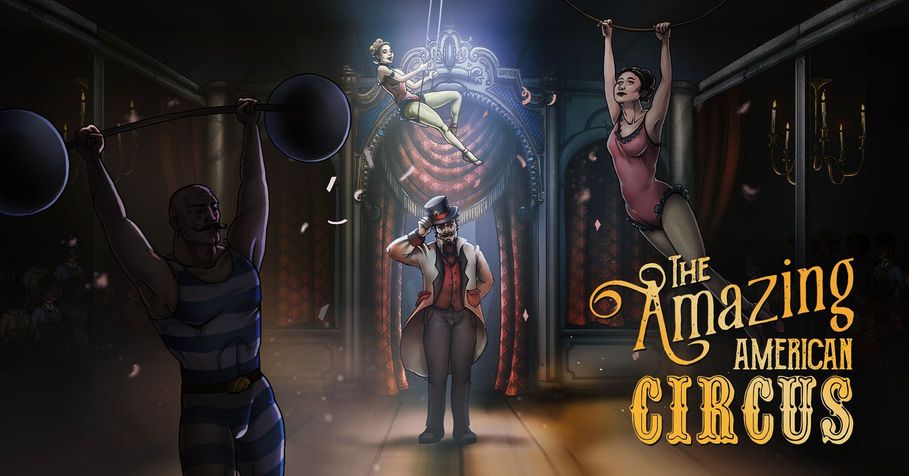Amazing American Circus
I’ve played a couple of deckbuilders in this series so far, and I will play more as this series winds on. They make up a not insignificant part of my library, and I have a soft spot in my heart for them. They’re also quite easy to play on touchpad, and I’m always more amenable to games that have smooth controls. It means, though, that I’ve played enough to have a sense of what works and what doesn’t, and am always curious to see a new take on the genre, and a new way of playing with familiar mechanics. It might mean my expectations are higher, but equally, that I tend to get more engrossed, whether the game deserves it or not.
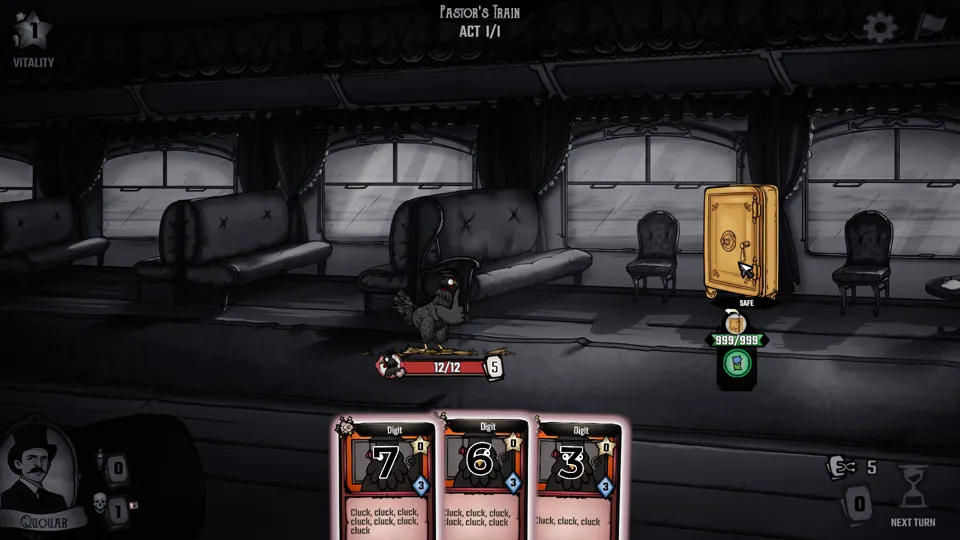 Okay, but this is a good sign, right?
Okay, but this is a good sign, right?
The Amazing American Circus is a circus-themed deckbuilder RPG. You play Jones, the son of a circus ringmaster who has inherited his father’s circus and now seeks to win $100,000 in the circus tournament. To do this, he must travel the US, giving shows, following quests, and training his performers.
There’s a lot here to like. The idea of a circus-themed deckbuilder is a clever and unique one, and adds great flavour to the various decks and their actions. The mechanics themselves also start to play nicely with the nature of deckbuilders themselves, taking game mechanics and deciding how they actually translate to reality. As an example, in deckbuilders like Across the Obelisk or Monster Train, it’s helpful to get as much card draw as possible to build up as much deck churn as possible, thus getting to the powerful cards quickly. Here, the deck represents the actions performers are taking on stage. Because they are having to perform these acts, churning through the deck means they have to keep performing, keep acting, and physically continue the show. It’s tiring, and the game translates that into an HP penalty when the deck is reshuffled. It’s an interesting and clever way to subvert how the genre is usually played to fit with the game’s theme.
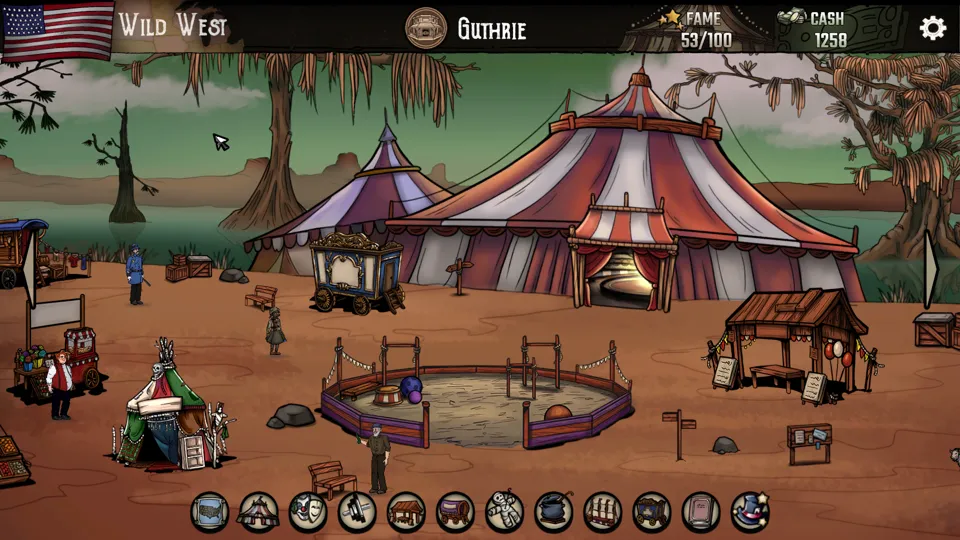 Ah yes. Oklahoma.
Ah yes. Oklahoma.
The thing about subverting a genre, though, is that it works best when the subversion creates something new and interesting. Subverting a genre’s conventions into something that doesn’t work doesn’t make a game interesting, just tedious. The Amazing American Circus’ subversion of deck churn, for example, was initially a fun challenge, and had me thinking about how to construct my party and build in such a way as to not only avoid the penalties, but make them work in my favour. It was a fun little challenge, until I solved it. I found a party make-up that made the mechanic work for me, and then proceeded to steamroll over every encounter from there. There was no real incentive for me to change, because the combats weren’t different enough to merit changing anything. Sure, the small nuances of who exactly I was fighting at any given point or what their abilities were might change, but the combats themselves never meaningfully changed. No one was immune to, say, the charms of a counting chicken, or resistant to the eyebrow waggles of my charming magician. Once I had a build that worked, there was no incentive for me to change it or do anything but keep spamming it in every combat.
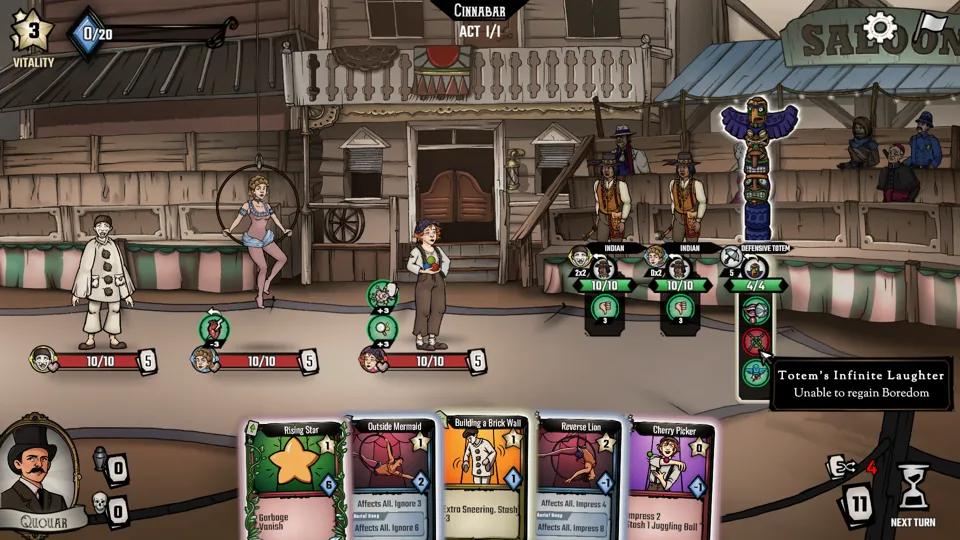 Oh, and there’s quite a bit of casual racism
Oh, and there’s quite a bit of casual racism
There is no real challenge in The Amazing American Circus, nor does it feel like there’s any real driving motivator. Change to the decks and characters happen so slowly that I stopped really thinking about how to build a deck at all. Decks potentially change when the character levels up, but because upgrades are undirected, and new cards are randomly generated, I found myself skipping more often than not, as the new cards were unhelpful, or the upgrades were to the wrong card. Playing through multiple combats just to get offered new cards I didn’t need made the process feel pointless, especially since what I had was already demolishing every enemy in my path. There was no incentive to change anything. It’s less a deckbuilder, and more a deck discoverer. Once you have a set-up that works, the process to change it becomes so tedious as to be non-existent, and the incentive to change is non-existent.
The mechanics themselves and the drive to create the best deck don’t motivate the player forward. Instead, the game relies on its story and Jones himself to keep the player motivated and willing to keep following the trail laid out before it. Here, again, the game missteps. The story itself is not a compelling one, as Jones isn’t a particularly compelling character. While the player has the choice of how to play Jones - is he earnest and enthusiastic, or old and cynical? - these choices aren’t sufficiently meaningful to actually build a character. Jones is, at best, a little face in the corner, occasionally insulting his uncle with some terrible voice acting, and otherwise doing nothing. The plot is thin, and once the sheer length of the journey to the end becomes clear, that plot is nowhere near enough to actually keep the player invested. The knowledge that each battle will be the same as the last makes the process of finishing the game an absolute slog, especially knowing that each action is accompanied by a painfully long animation.
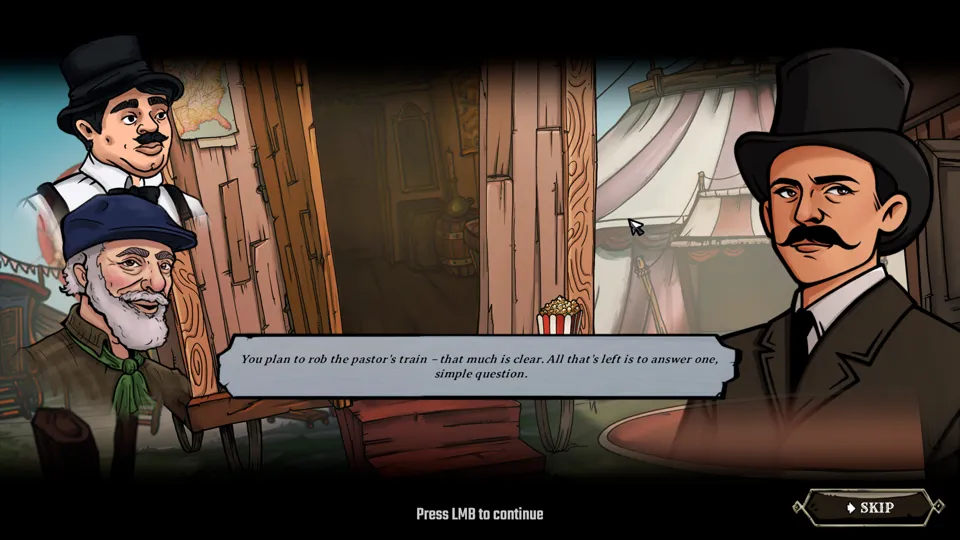 That question better be “why.”
That question better be “why.”
I wanted to like The Amazing American Circus. Its theme had so much potential, from how to perform for different audiences, to how to build a circus, to route planning and optimisation. In the end, though, The Amazing American Circus does none of that. It has a thin layer of RPG doing its best to propel the player forward through a repetitive and dull gameplay loop that, once solved, rapidly wears out its welcome. The game has interesting ideas, but doesn’t do a good enough job executing any of them. Instead, it just becomes a dull, tedious slog through small American town after small American town.
I wonder if that’s what the actual traveling performer experience is like. Maybe it did capture something real after all.
Developer: Klabater
Genre: Deck Builder, Rpg
Year: 2021
Country: Poland
Language: English
Play Time: 18 Hours
Youtube: https://youtu.be/LKLiDVBlrgc
